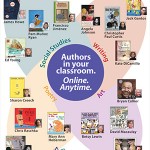 So I’ve been asked to talk about an element of writing my book, The Emerald Atlas, that I struggled with, and honestly, it’s hard to pick just one thing. I could talk about the number of times I pulled my hair out for imagining that I could write a mind-twisty time travel story. Or I could talk about the difficulty of working in a genre as well-established as children’s fantasy, a genre in which I would be using characters and tropes that readers had seen a thousand times before and it was my job to figure out how I was going to breath new life into those dusty conventions.
So I’ve been asked to talk about an element of writing my book, The Emerald Atlas, that I struggled with, and honestly, it’s hard to pick just one thing. I could talk about the number of times I pulled my hair out for imagining that I could write a mind-twisty time travel story. Or I could talk about the difficulty of working in a genre as well-established as children’s fantasy, a genre in which I would be using characters and tropes that readers had seen a thousand times before and it was my job to figure out how I was going to breath new life into those dusty conventions.Guest Blogger: John Stephens
 So I’ve been asked to talk about an element of writing my book, The Emerald Atlas, that I struggled with, and honestly, it’s hard to pick just one thing. I could talk about the number of times I pulled my hair out for imagining that I could write a mind-twisty time travel story. Or I could talk about the difficulty of working in a genre as well-established as children’s fantasy, a genre in which I would be using characters and tropes that readers had seen a thousand times before and it was my job to figure out how I was going to breath new life into those dusty conventions.
So I’ve been asked to talk about an element of writing my book, The Emerald Atlas, that I struggled with, and honestly, it’s hard to pick just one thing. I could talk about the number of times I pulled my hair out for imagining that I could write a mind-twisty time travel story. Or I could talk about the difficulty of working in a genre as well-established as children’s fantasy, a genre in which I would be using characters and tropes that readers had seen a thousand times before and it was my job to figure out how I was going to breath new life into those dusty conventions.

 The seed for my newest young adult novel, This Thing Called the Future (Cinco Puntos, 2011), was planted five years ago when I was studying the Zulu language at a university in Pietermaritzburg, South Africa. The Zulu family I stayed with had two young teenage girls—thirteen and fourteen—who were incredibly hard-working girls and always respectful of their elders. Yet the thirteen year old got in trouble while I was there because she was caught kissing her boyfriend at church. Her boyfriend was a man in his thirties.
The seed for my newest young adult novel, This Thing Called the Future (Cinco Puntos, 2011), was planted five years ago when I was studying the Zulu language at a university in Pietermaritzburg, South Africa. The Zulu family I stayed with had two young teenage girls—thirteen and fourteen—who were incredibly hard-working girls and always respectful of their elders. Yet the thirteen year old got in trouble while I was there because she was caught kissing her boyfriend at church. Her boyfriend was a man in his thirties. TeachingBooks.net is bringing summer reading 2011 to life. Whether you're promoting the program theme of One World, Many Stories, You are Here,Splash! Celebrate Summer, or another topic, the authors and illustrators presented in this month's column are bound to be on your list. From audio to video recordings, TeachingBooks.net has something for you.
TeachingBooks.net is bringing summer reading 2011 to life. Whether you're promoting the program theme of One World, Many Stories, You are Here,Splash! Celebrate Summer, or another topic, the authors and illustrators presented in this month's column are bound to be on your list. From audio to video recordings, TeachingBooks.net has something for you.